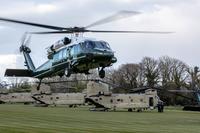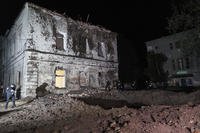Army Col. Tanya McGonegal was 25 when she experienced the first “only” in her military career. She was the sole woman in the June 1999 graduating class at Virginia State Officer Candidate School.
The graduation set the tone for McGonegal’s 25-year career with the Army National Guard, where she continues paving the way for future generations of military leaders.
“I don’t wake up in the morning and think, ‘I am going to inspire people to do more and be more,'” McGonegal said with a laugh. “But I am very interested in challenging myself to do more and be more, and if that’s an inspiration to others to do the same — in a way that is kind and professional — that is a plus.”
McGonegal has formally been recognized twice as being the first Black woman to lead a unit, most recently in a historic change of command ceremony Feb. 9 for the U.S. Northern Command’s Joint Task Force-Civil Support in Newport News. The joint task force, based at Fort Eustis, is responsible for civil support and mission leadership during disasters.
At the Fort Eustis-based federal command, McGonegal is responsible for leading about 160 members on a daily basis. If a crisis occurs, McGonegal could be responsible for coordinating a force of 5,200 who stand ready to deploy within 24-96 hours of notice for any natural or manmade disaster.
“When you take command of a unit, as a leader, your first priority is the organization and the service members and their families,” McGonegal said. “You don’t necessarily stop and think, ‘Oh, am I making history in taking command today?'”
McGonegal served for almost a decade as a military police officer for the Army National Guard, according to her Army biography. She contributed to Operation Noble Eagle in 2001, Operation Iraqi Freedom in 2003 and Hurricane Katrina relief efforts in 2005.
During her time in the Reserve force, McGonegal said she spent four years working as a Fairfax County police officer. But due to the deployments, she transitioned to serve full-time in the military.
McGonegal has served as an executive officer six times.
In 2012, she took command of the 151st Military Police Battalion in the West Virginia Army National Guard. She was not recognized for it at the time, but the Joint Task Force-Civil support confirmed McGonegal was the first Black woman to lead the unit.
“You are selected by other leaders in the organization based on your ability to do the job, your professionalism as a leader, as an officer,” McGonegal said.
McGonegal was recognized in 2019 as the first Black woman to lead the 77th Brigade Troop, relieving Col. Michaelle Munger, the first female brigade commander in the West Virginia Army National Guard’s history.
“It is about a broader awareness of diversity, inclusion and how well we are represented in the military services,” McGonegal said. “Females serving in uniform — it’s a fairly small percentage. So, it is nice that we are getting recognized for doing the job and being willing to serve in that capacity.”
Women make up only 17.5% of the active-duty armed forces and 21.6% of Reserve forces but their participation has been growing over the past two decades, according to the Department of Defense’s 2022 demographics report. Since 2005, the number of women in active-duty service has grown by 14.2% and the number of women in Reserves has increased by 17.3%.
One year before the day of McGonegal’s historic joint task force change of command ceremony, the unit put out a statement that it is “defined by diversity.”
“The military is a microcosm of society, and it’s important that the organization reflects the diverse backgrounds, perspectives and experiences of the American people. A diverse workforce brings unique skills and perspectives that can lead to better problem-solving, decision-making and creativity,” then Col. Timothy Sulzner said in the 2023 release.
As a woman in a military leadership position, McGonegal said she has been able to be a sounding board for other women and minorities in uniform.
“It’s given me more of an opportunity to mentor and to provide them an opportunity to have a voice and to be seen,” she said.
Her formula for being a “safe leader,” she said, is simple: Be receptive. Listen and understand what is going on, and address the situation right away.
“You can’t allow somebody else’s experiences in life to dictate how you react and respond,” McGonegal said. “You have to control your own emotions, and sometimes that means if the situation is not good, going in another direction.”
A large part of McGonegal’s responsibility is connecting with the local community and its emergency response agencies. McGonegal immediately began that task, connecting with organizations across Virginia and West Virginia, including the Virginia Beach Vet Center.
Her main focus, she said, is to make sure the unit is maintaining its readiness to respond to incidents when needed.
“When we wake up every day, everyone has to put their pants on one leg at a time and go out into the world and do and be,” she said. “I get to work with great people along the way and if it inspires others, that is great.”
©2024 The Virginian-Pilot. Visit pilotonline.com. Distributed by Tribune Content Agency, LLC.











